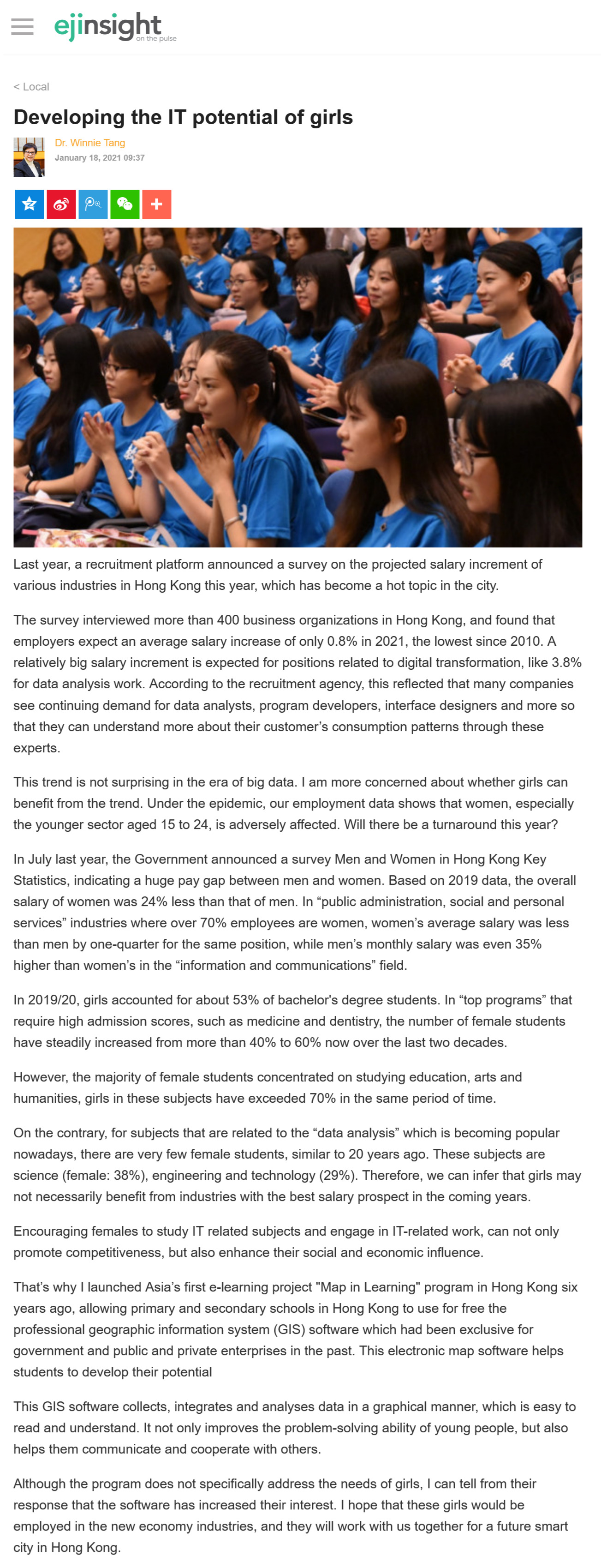網上版請按此

Developing the IT potential of girls
Last year, a recruitment platform announced a survey on the projected salary increment of various industries in Hong Kong this year, which has become a hot topic in the city.
The survey interviewed more than 400 business organizations in Hong Kong, and found that employers expect an average salary increase of only 0.8% in 2021, the lowest since 2010. A relatively big salary increment is expected for positions related to digital transformation, like 3.8% for data analysis work. According to the recruitment agency, this reflected that many companies see continuing demand for data analysts, program developers, interface designers and more so that they can understand more about their customer's consumption patterns through these experts.
This trend is not surprising in the era of big data. I am more concerned about whether girls can benefit from the trend. Under the epidemic, our employment data shows that women, especially the younger sector aged 15 to 24, is adversely affected. Will there be a turnaround this year?
In July last year, the Government announced a survey Men and Women in Hong Kong Key Statistics, indicating a huge pay gap between men and women. Based on 2019 data, the overall salary of women was 24% less than that of men. In "public administration, social and personal services" industries where over 70% employees are women, women's average salary was less than men by one-quarter for the same position, while men's monthly salary was even 35% higher than women's in the "information and communications" field.
In 2019/20, girls accounted for about 53% of bachelor's degree students. In "top programs" that require high admission scores, such as medicine and dentistry, the number of female students have steadily increased from more than 40% to 60% now over the last two decades.
However, the majority of female students concentrated on studying education, arts and humanities, girls in these subjects have exceeded 70% in the same period of time.
On the contrary, for subjects that are related to the "data analysis" which is becoming popular nowadays, there are very few female students, similar to 20 years ago. These subjects are science (female: 38%), engineering and technology (29%). Therefore, we can infer that girls may not necessarily benefit from industries with the best salary prospect in the coming years.
Encouraging females to study IT related subjects and engage in IT-related work, can not only promote competitiveness, but also enhance their social and economic influence.
That's why I launched Asia's first e-learning project "Map in Learning" program in Hong Kong six years ago, allowing primary and secondary schools in Hong Kong to use for free the professional geographic information system (GIS) software which had been exclusive for government and public and private enterprises in the past. This electronic map software helps students to develop their potential
This GIS software collects, integrates and analyses data in a graphical manner, which is easy to read and understand. It not only improves the problem-solving ability of young people, but also helps them communicate and cooperate with others.
Although the program does not specifically address the needs of girls, I can tell from their response that the software has increased their interest. I hope that these girls would be employed in the new economy industries, and they will work with us together for a future smart city in Hong Kong.
Dr. Winnie Tang
Adjunct Professor, Department of Computer Science, Faculty of Engineering; Department of Geography, Faculty of Social Sciences; and Faculty of Architecture, The University of Hong Kong